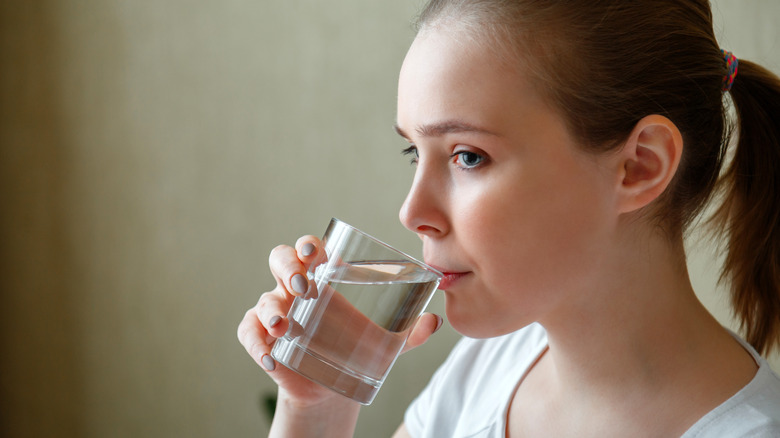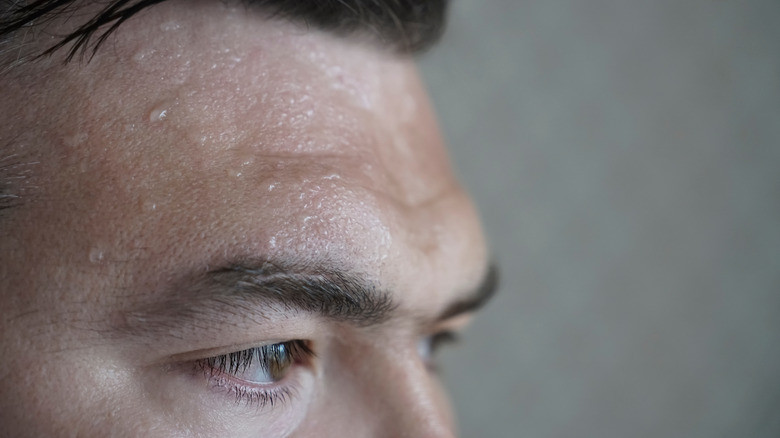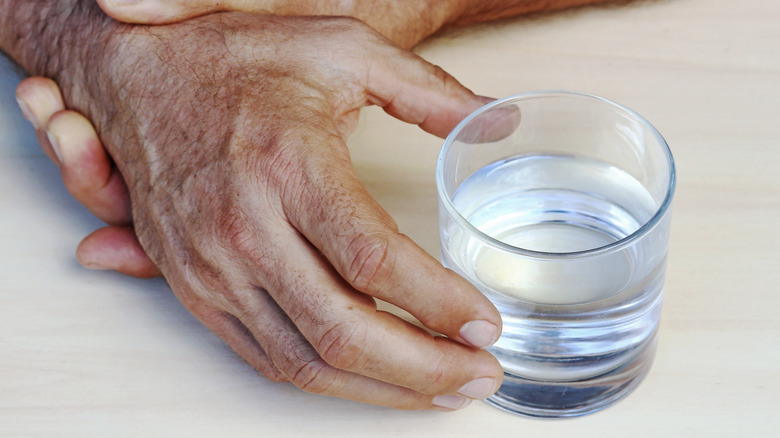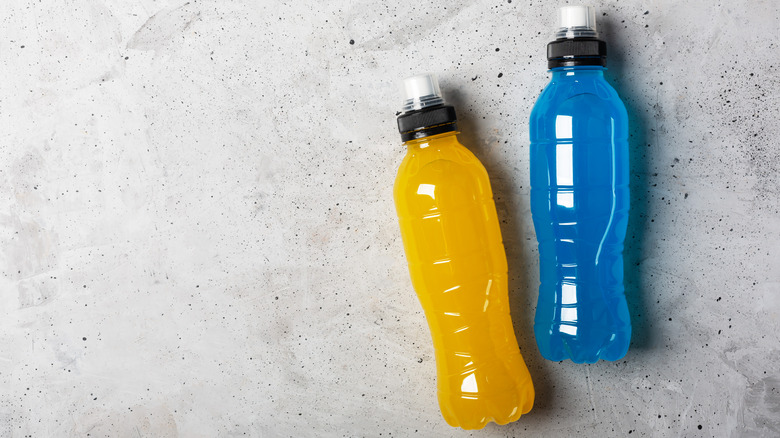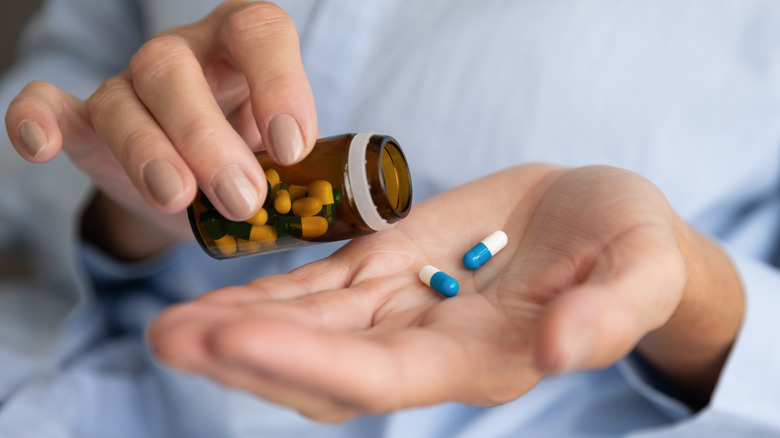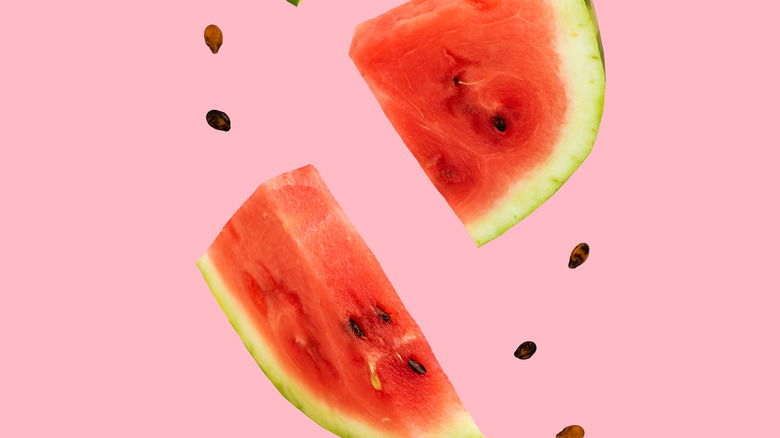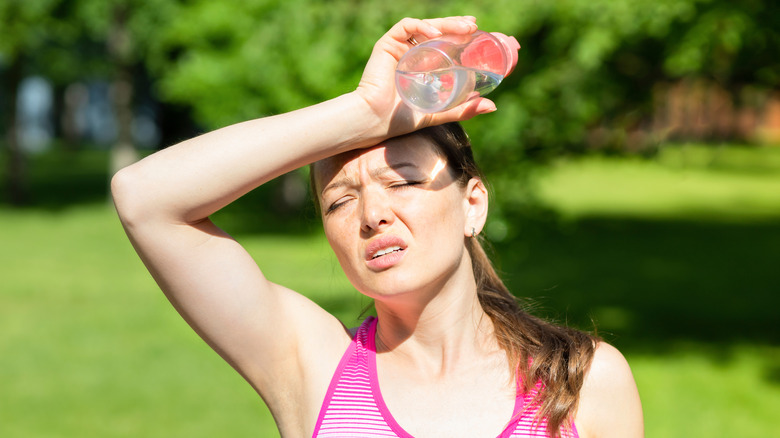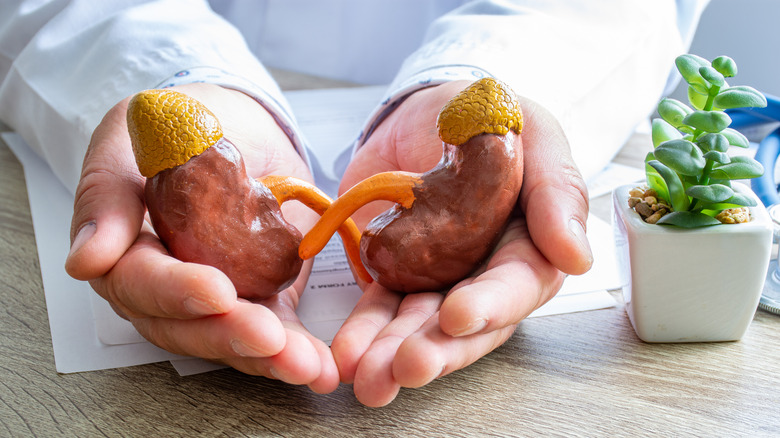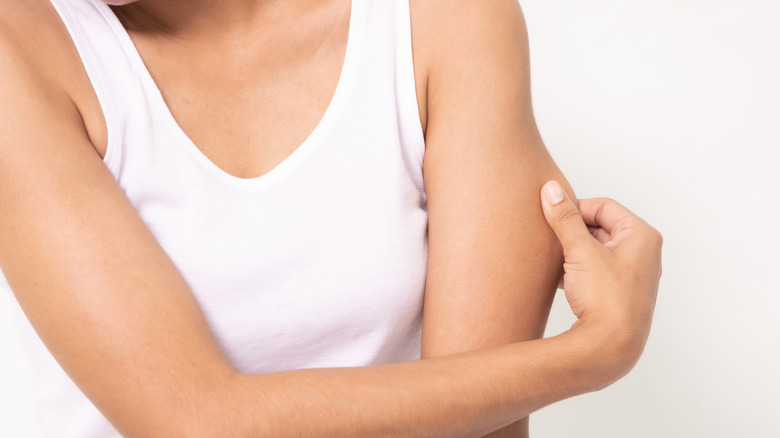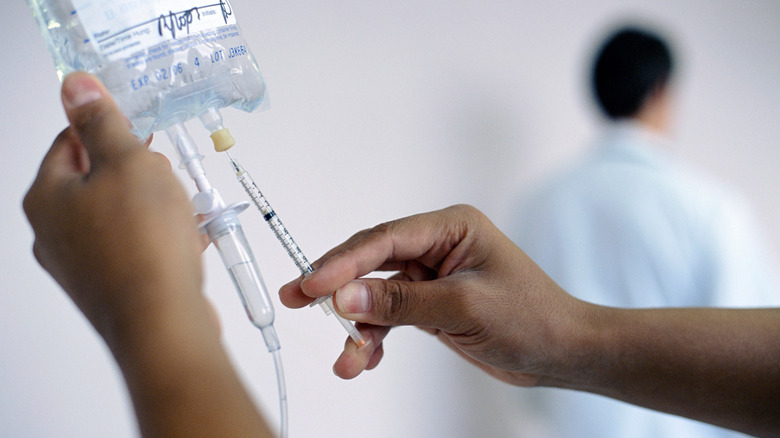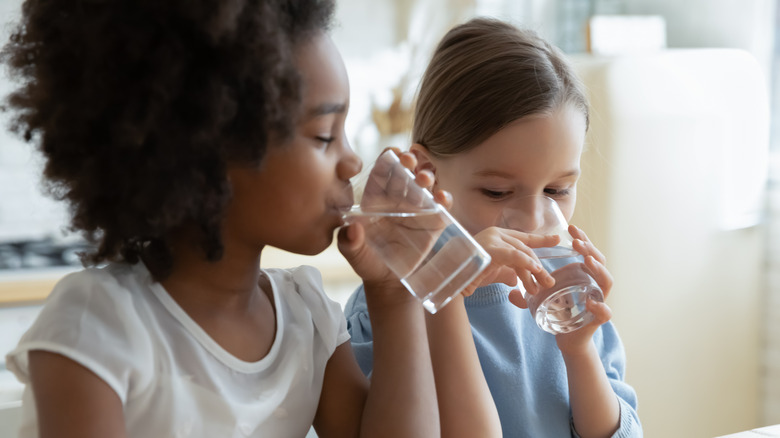Dehydration Explained: Causes, Symptoms, And Treatments
The next time you think about grabbing a soda or juice to quench your thirst, you might want to consider a plain glass of water instead. Water does a lot more for our bodies than keep us from feeling thirsty. In fact, it's essential for bodily processes to work right. Without water, our bodies wouldn't be able to regulate temperature, keep our joints lubricated, or get rid of all the unwanted waste that naturally builds up in our system (per the CDC).
That's why dehydration can be such a harmful thing. When you're dehydrated, it means that you're not getting enough water for your body to do many of the vital things it needs to do. Sure, you might just feel thirsty, but your body is begging for help. And once it gets to an emergency state of needing water, you might feel more acute symptoms, like headaches, dizziness, or muscle cramps (via Cleveland Clinic).
In 2004, The National Academies of Sciences, Engineering, and Medicine set blanket rules for water intake, which have stuck around ever since. For women, about 91 ounces of water each day is the goal; for men, make that 125 ounces daily. Make a habit of drinking less than that, and you could wind up on the brink of dehydration. Here's everything you need to know about not staying hydrated.
How do we get dehydrated?
The easiest way to get dehydrated is by simply not drinking enough water each day. However, there are certain times when our body might need extra water, during which we may not realize that we haven't bumped up our intake enough to keep up.
Sweating is one way we can lose water quickly, and it's easy not to pay attention to it. When you're physically active, you're probably focusing on getting a good burn going rather than water loss. But Healthline says that excessive sweating can lead to dehydration, along with excessive urination. Being sick can also do the trick, especially with symptoms like vomiting and diarrhea, which expel necessary nutrients that keep the body hydrated.
Some medical conditions can also cause changes in the body that lead to dehydration. Diabetes, for instance, can cause people to urinate more often as their bodies attempt to get rid of excess sugars. As fluids leave the body, you naturally need more. When those fluids aren't replenished rapidly enough, dehydration can follow (via Abbott).
Not everyone needs the same amount of water to stay hydrated
Although The National Academies of Sciences, Engineering, and Medicine suggested rules for proper water intake for men and women over a decade ago, drinking water isn't necessarily a one-size-fits-all task. Depending on health conditions, activity levels, and other factors, some people might need to drink more or less water than others. The CDC notes that you may need to drink more than the suggested amount of water when you're physically active, ill, or in hot weather.
Suggestions for different age groups may vary, too. The American Academy of Pediatrics suggests that kids aged 1-3 need about four cups of beverages each day, but those beverages can include both water and milk. As children get older, they'll need more cups per day, of course. Meanwhile, experts suggest that seniors who might have trouble remembering more complicated strategies stick with the simple rule of drinking eight glasses of water each day, or about 64 ounces (via Cleveland Clinic).
And, if you have any medical conditions, you'll want to speak with your doctor about proper water intake. For instance, people with chronic kidney stones and other kidney issues might require additional water intake to maintain kidney health (per The Lancet Kidney Campaign).
Tell-tale signs of dehydration
Some symptoms of dehydration are much more common to spot than others. Perhaps one of the most obvious ways to tell if you're dehydrated is whether or not you're feeling thirsty. Of course, at that point, you may be well and truly on your way to dehydration. As registered dietician nutritionist Ginger Hultin tells Everyday Health, "This can be a really helpful reminder to people, because many of us aren't very in tune with our thirst, so once we realize we're thirsty, our body really is calling out for water." Hultin also says that dark-colored urine can also indicate that you're not drinking enough water.
Other signs of dehydration include dizziness, headaches, weakness, and fatigue. If you're able to check your vital signs at home and notice that you have low blood pressure but a high heart rate, you might also need more water (via Cleveland Clinic). The Orthopedic Institute also explains that one of the most common causes of muscle cramps is dehydration, namely because a lack of fluid prevents the muscles from relaxing properly.
Sneakier signs of dehydration
Unfortunately, not all symptoms of dehydration are as easy to point out as common ones. In fact, some signs can point to different conditions altogether, causing someone to miss the fact that they're actually dehydrated until a doctor's assessment proves otherwise.
The Cleveland Clinic points out that constipation, chills or heat intolerance, a loss of appetite, sugar cravings, and a dry cough can all be warning signs that your body needs water. On the flip side, you might also feel hungry. Registered dietician Laura Burak tells Allrecipes that our brains can sometimes confuse thirst for hunger, so excessive hunger pangs can also signal dehydration. Burak also mentions digestive pain and bloating as two more indicators.
Bad breath or an unsettling taste in your mouth might also stem from dehydration. "If you're not producing enough saliva, you can get bacterial overgrowth in the mouth, and one of the side effects of that is bad breath," cardiologist John Higgins explains to Everyday Health. Higgins also suggests paying attention to dry skin, as water is necessary to keep it hydrated.
Some people are more at risk than others
Do you feel like you get dehydrated faster than other people you know? There could be some science behind it. Like diabetes, heart problems, and many other conditions, dehydration is riskier for some people than it is for others.
WebMD states that babies and young children can become dehydrated more quickly than older children and adults, especially when they're sick. Unfortunately, babies can't tell us when they feel thirsty, so it could be challenging to know when there's a problem unless they're exhibiting outward signs of dehydration. Meanwhile, people with a sore throat or illness that leaves them not feeling well, in general, might skip eating and drinking in favor of staying in bed, also leading to potential dehydration. Active people and those with chronic conditions could also be more at risk of dehydration.
The elderly carry a higher risk, too. Care Patrol reports that seniors with incontinence issues must consciously remember to drink water to replace their lost fluids, which isn't easy for some to remember to do. Additionally, aging itself can cause metabolic changes that make it even more important for older people to keep up with their water intake.
It's more common during pregnancy
Pregnant women also fall into a more at-risk group for dehydration than the general population. According to Medical News Today, it's more common to get dehydrated while pregnant than under nearly any other circumstance, mostly because pregnancy requires a lot of nutrients to grow a healthy baby. Pregnant women may simply not drink enough water to keep up with the increased demand for the baby. Or, their bodies may not hold enough water in if they're frequently feeling nauseous or throwing up.
Dehydration can lead to severe consequences for an unborn baby. A 2021 article published in the Journal of Nutritional Science indicated that prolonged or extensive dehydration can lead to low birth weight and shorter length for newborns. According to study results of pregnant women found to be dehydrated via urine samples, a "significant relationship" existed between dehydration and smaller measurements of the baby at birth. In addition to low birth weight and length, researchers also found that chest and head measurements were smaller in babies born from dehydrated mothers.
How electrolytes play a role
Technically, hydration goes deeper than just water. Your body also needs electrolytes to stay properly hydrated. Electrolytes are minerals, such as potassium and sodium, that help to regulate fluid levels in the body. When they're imbalanced, this state could lead to dehydration, as well as kidney problems, heart issues, and more (via University of Michigan Health).
A 2021 study led by Edith Cowan University researchers found that physically active people who drank water enhanced with electrolytes during and after they exercised had reduced painful muscle cramps compared to those who drank just plain water. According to lead researcher Ken Nosaka, "This is likely because pure water dilutes the electrolyte concentration in our bodies and doesn't replace what is lost during sweating."
However, registered dietician Kate Patton tells Cleveland Clinic that electrolyte drinks aren't always the best option for restoring those minerals. According to Patton, exercises that go on for over an hour are best suited for electrolyte drinks because they can help you replenish lost electrolytes. Still, it's important to read labels to ensure you're not taking in unnecessary calories and sugar.
Your medications could make you dehydrated
A 2019 review published in Nutrients explored the relationship between medications and hydration. According to the authors, drugs and hydration aren't often studied together, but they certainly should be. After analyzing study results, the authors indicate a strong need for medical professionals to review the drugs their patients take when considering hydration status, as certain drugs can affect water balance in the body. Notably, the elderly are particularly at risk for drug-induced dehydration.
What types of drugs could be culprits here? According to Everyday Health, laxatives are among the most common problem-causing medications because they can cause diarrhea, which can move fluids out of the body at fast rates. Oral medications for type 2 diabetes and over-the-counter migraine medications containing caffeine could also lead to dehydration. Doctor of Pharmacy Aaron Emmel also explains that chemotherapy drugs with side effects like nausea and vomiting are risky, too. "The degree of vomiting that some of these drugs cause can be substantial," says Emmel, which means that those who are dealing with these side effects can easily become dehydrated.
Food can help you stay hydrated
Water isn't the only thing that can keep you hydrated. Food can do it, too — but only certain kinds. In particular, we're talking about foods that are rich in water. Chicken broth, plain yogurt, and bell peppers have some pretty seriously high water content, for one. There are also juicy foods like watermelon, tomatoes, celery, and zucchini, all of which contain more than 90% water. This means that, when you eat them, you're basically drinking water alongside the consumption of fiber and other nutrients. So, if you find it difficult to keep up with drinking water all day, you can also reach for water-rich foods once in a while as fill-ins (via Healthline).
Even more importantly, some high-water-content foods like watermelon also contain the electrolytes we need to stay hydrated. Plus, many of them are low in sugar (or, better yet, have no sugar at all), contain loads of other vitamins and minerals that are essential to our health, and are low in calories.
Don't drink too much water to curb dehydration
This tactic may sound like the complete opposite of what you'd first guess, but drinking a bunch of water isn't always the solution to preventing dehydration or getting you out of a dehydrated state. In fact, drinking too much water can also be bad for your health, leading to a condition called water intoxication. According to Medical News Today, water intoxication can cause brain cells to swell from fluid retention, initially leading to headaches, nausea, and vomiting. More severe cases can cause confusion, fatigue, increased blood pressure, and breathing problems.
One of the more dangerous side effects of water intoxication is a condition known as hyponatremia. With hyponatremia, too much water in the body dilutes the sodium you need for a healthy electrolyte balance. A drop in sodium essentially confuses the cells into taking in more water, which eventually causes them to swell. Although some medications and medical conditions like kidney failure and congestive heart failure can lead to hyponatremia, it's commonly caused by drinking too much water (via LiveScience).
Dehydration takes a toll on your body
A dehydrated body can quickly become an unhealthy body. The Mayo Clinic lists kidney failure, low blood volume, and brain swelling as severe conditions that can happen when you get seriously dehydrated. Seizures can also stem from an electrolyte imbalance, and — in an absolute worst-case scenario — death or coma may result from the most severe cases of dehydration.
Long-term effects are important to remember, too. Consider that water is necessary for proper kidney function. The National Kidney Foundation says that kidneys need water to help keep blood vessels open as they flush waste from the body. Chronic dehydration, then, can impair kidney function and lead to complications like kidney stones or urinary tract infections. The Heart Foundation also stresses the importance of water for heart health. Dehydration causes sodium retention, which thickens the blood and makes it harder for the heart to pump.
Dehydration can even influence your mood, say experts from the University of Connecticut. A study led by the university's researchers showed that even mild dehydration could affect mood and energy levels. Lead researcher Lawrence E. Armstrong explains, "Our thirst sensation doesn't really appear until we are 1 [percent] or 2 percent dehydrated. By then, dehydration is already setting in and starting to impact how our mind and body perform."
Diagnosing dehydration
In some cases, people can tell if they're dehydrated simply by how they feel, whether that's a change in mood or the classic parched throat. However, thirst isn't always an accurate measure of dehydration (per the Mayo Clinic). Actual diagnostic tests can be more accurate for gauging hydration levels for people experiencing some related symptoms, like confusion, dark-colored urine, or dry mouth. If you visit your doctor with these or other dehydration symptoms, they'll likely start with a physical exam, ask you about your symptoms, and check your vital signs (per MedlinePlus).
Some physicians may also suggest other tests to evaluate you for dehydration. Something called the skin turgor test specifically looks at your skin's hydration level. Skin can sometimes indicate dehydration if it does not bounce back quickly after being pinched (via Verywell Health). University of Michigan Health also states that an electrolyte panel blood test can show dehydration through electrolyte imbalances. The panel checks blood levels of sodium, chloride, potassium, and carbon dioxide.
Treating dehydration
Mild cases of dehydration may be treated at home. However, checking with your doctor for suggested methods can be a good idea. Medical professionals may suggest drinking more water, an electrolyte drink, or clear broths to rehydrate yourself. Some may also encourage you to eat gelatin (per Healthgrades).
However, more severe cases might require more intensive medical intervention, especially in people who have other conditions. A common treatment for these cases is intravenous rehydration, which replaces lost fluids through an IV line inserted into the body. According to Healthline, different IV rehydration fluids are available, and trained medical professionals can determine exactly what type a dehydrated person needs.
For instance, infants and children might need different treatments than adults. A baby could bounce back from dehydration by getting extra breastmilk or formula throughout the day. Meanwhile, oral hydration solutions might be the doctor-suggested method for children, especially if they're having trouble keeping liquids down due to an illness (per WebMD).
The ultimate goal? Prevention
While dehydration is something we can often prevent by ensuring that we get enough water in our bodies each day, it's not always that easy. Life gets busy, and it's not that hard to get off track when it comes to our water intake. However, preventing dehydration is the best route to take to avoid ending up with severe complications.
To do that, Cleveland Clinic suggests tracking your water intake each day and consciously boosting your consumption when you know you'll be in warm climates or participating in strenuous physical activity. Also, it's always a good idea to check with your primary care physician as to just how much water your body needs in a day.
If you have other medical conditions that interfere with your hydration or you seem to get dehydrated easily, you'll also want to keep in close contact with your physician. Keep a list of medications handy and let your doctor know about any symptoms you experience frequently. They'll consider your medical history to create a dehydration prevention plan that can help to keep your body working well (via Mayo Clinic).

